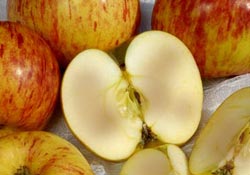Catabolic Reaction and Oxidation

Let’s now look more closely at the catabolic reaction.
One of the most basic reactions is that of oxygen with other substances (molecules). When oxygen interacts with another substance, a catabolic reaction called oxidation occurs. Oxidation is a reaction in which the atoms in an element lose electrons due to an interaction with oxygen. The molecule being oxidized donates an electron (and so is oxidized). A by-product of this reaction is a free electron called a free radical. Oxidation is a natural process that is a part of the chemistry of the outer world as well as inside our bodies; the free radicals can be a source of further problems if they become too numerous.
Two recognizable examples of oxidation are an apple cut in half, beginning to turn brown, or the rust that forms on your bicycle fender. One could think of oxidation in your body as metabolic rust.
Free radicals are highly unstable and can have a positive (donator electron) or negative (receptor site for electron) charge. This means free radicals scavenge the body looking for a place to donate an electron or a place to take one, depending on the charge they carry. This process is highly destructive to other substances and tissues in the body.
An antioxidant, then, is a molecule that can donate or receive and electron to the highly unstable free radical, making it stable and harmless again.
Antioxidants can be used to preserve products (such as unsaturated oils) that are particularly susceptible to oxidation. To do this, an antioxidant substance (such as vitamin C or rosemary) can be added to products to slow down the oxidation rate.
Antioxidants can also be used to help preserve your tissues by reducing the amount of free radicals within your body. Oxidation and free radicals are some of the most fundamental underlying causes of premature aging and disease. Eating antioxidant-rich foods, such as blueberries or oranges, will help reduce the oxidation rate within your cells.
In addition, other outside influences can be oxidative. Sunlight, for instance, has a strong oxidative effect on substances it comes into direct contact with. For this reason, it is important to keep oils and other perishable items out of direct sunlight.
For a much more in-depth study on oxidation and health, visit the following link: Seven Aspects of Oxygen and Oxidation.